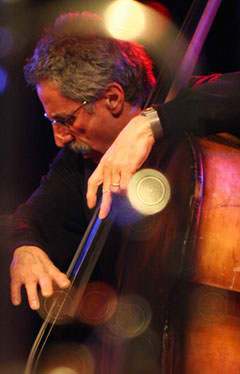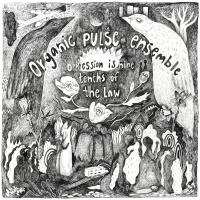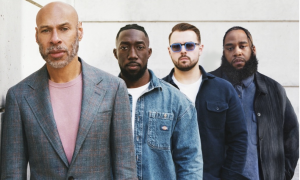
On December 12, bassist and composer Mario Pavone will be in Philadelphia with Orange Double Tenor. The sextet, featuring saxophonists Tony Malaby and Marty Ehrlich, trumpeter Dave Ballou, pianist Peter Madsen and drummer Gerald Cleaver, will perform Pavone’s new work, Arc Suite T/Pi T/Po. Commissioned by Chamber Music America’s 2009 Jazz Works, and released last month by Playscape Recordings to coincide with Pavone's 70th Birthday, the work shows Pavone looking back on his extensive and flourishing life as a musician. Ars Nova Workshop had a chance to catch up with Pavone to talk about his career, and here is the first half of the two part interview.
In November, 1961, you drove from Connecticut to New York City to see John Coltrane play at the Village Vanguard. What impact did this performance have on you?
It was life changing. I had not yet begun music studies, but was an avid listener. The full group that night, with Trane, Eric Dolphy, McCoy Tyner, Jimmie Garrison, and Elvin Jones, recorded one of the most seminal albums ever: Live at the Village Vanguard, two tunes, 1 hour set, “Impressions” and “India.” At the time I wasn’t sure what I was hearing—pinned and riveted to my seat – but returned home and to my studies at the University of Connecticut and soon after rented a bass fiddle.
When Coltrane died six years later you drove back to New York City for the funeral and ultimately decided to stay to pursue a life of music. How did this loss inspire you?
For me, in Trane’s music the message was “you too can do music because there is music in all of us.” Saint Peter’s was jammed with thousands, steamy, with Albert Ayler and Ornette Coleman playing up in the balcony section and Trane’s remains on the alter. It was a big loss for the music community, with saxophonists not knowing how to proceed. Those not yet committed to Trane’s more open vision of the music were soon to turn towards it. I quit my engineering gig, committed fully to the bass, and never looked back.
Was it a difficult transition to make? Was there a strong network and community of improvisers and creative artists?
The Jazz Composers Orchestra Association existed then, including Paul and Carla Bley, Bill Dixon, Cecil Taylor, Archie Shepp, and many others. The community was strong and also united in political terms, especially around opposition to the Vietnam War. We played every day, all day and night, with musicians coming and going, such as Rashied Ali, Stafford James, Roswell Rudd, Perry Robinson, Laurence Cook, Mark Whitecage, and many others.
Can you talk about the creative energy alive during the loft scene? Who were some of the musicians you worked with and who had the greatest influence on your playing?
Many mentioned above apply here. I toured and recorded heavily with Paul Bley and Bill Dixon, who were major influences. Since then I have been strongly influenced by Wadada Leo Smith, Anthony Braxton, Dewey Redman, Henry Threadgill, and the younger musicians who play with me today, like Tony Malaby, Jimmy Greene, Dave Ballou, Gerald Cleaver, Steven Bernstein, Michael Sarin, Matt Wilson, Tyshawn Sorey, Craig Taborn, Katherine Davis, and Russ Johnson, and contemporaries like Marty Ehrlich and Peter Madsen.
What are some of the changes you’ve witnessed in the jazz community over the last five decades?
The scene has always run in cycles, up and down at different times. We all know that serious music is suffering large reductions in CD sales, and so on, since we are in a technological transition with downloading. Players are better educated and assimilate the theoretical information at quicker rates, but they still need to experience the musical life in order to have stories to tell. It has always been a struggle, and what hasn’t changed is the need to stay fully committed to one’s work even through adversity.
If today a young jazz musician approached you and said he/she was intending to quit his/her day job and devote him/herself completely to music, what advice would you offer?
If you feel you have your own voice, go for it!
Mario Pavone’s Orangle Double Tenor will be performing on Sunday, November 12 at International House (3701 Chestnut Street).
In November, 1961, you drove from Connecticut to New York City to see John Coltrane play at the Village Vanguard. What impact did this performance have on you?
It was life changing. I had not yet begun music studies, but was an avid listener. The full group that night, with Trane, Eric Dolphy, McCoy Tyner, Jimmie Garrison, and Elvin Jones, recorded one of the most seminal albums ever: Live at the Village Vanguard, two tunes, 1 hour set, “Impressions” and “India.” At the time I wasn’t sure what I was hearing—pinned and riveted to my seat – but returned home and to my studies at the University of Connecticut and soon after rented a bass fiddle.
When Coltrane died six years later you drove back to New York City for the funeral and ultimately decided to stay to pursue a life of music. How did this loss inspire you?
For me, in Trane’s music the message was “you too can do music because there is music in all of us.” Saint Peter’s was jammed with thousands, steamy, with Albert Ayler and Ornette Coleman playing up in the balcony section and Trane’s remains on the alter. It was a big loss for the music community, with saxophonists not knowing how to proceed. Those not yet committed to Trane’s more open vision of the music were soon to turn towards it. I quit my engineering gig, committed fully to the bass, and never looked back.
Was it a difficult transition to make? Was there a strong network and community of improvisers and creative artists?
The Jazz Composers Orchestra Association existed then, including Paul and Carla Bley, Bill Dixon, Cecil Taylor, Archie Shepp, and many others. The community was strong and also united in political terms, especially around opposition to the Vietnam War. We played every day, all day and night, with musicians coming and going, such as Rashied Ali, Stafford James, Roswell Rudd, Perry Robinson, Laurence Cook, Mark Whitecage, and many others.
Can you talk about the creative energy alive during the loft scene? Who were some of the musicians you worked with and who had the greatest influence on your playing?
Many mentioned above apply here. I toured and recorded heavily with Paul Bley and Bill Dixon, who were major influences. Since then I have been strongly influenced by Wadada Leo Smith, Anthony Braxton, Dewey Redman, Henry Threadgill, and the younger musicians who play with me today, like Tony Malaby, Jimmy Greene, Dave Ballou, Gerald Cleaver, Steven Bernstein, Michael Sarin, Matt Wilson, Tyshawn Sorey, Craig Taborn, Katherine Davis, and Russ Johnson, and contemporaries like Marty Ehrlich and Peter Madsen.
What are some of the changes you’ve witnessed in the jazz community over the last five decades?
The scene has always run in cycles, up and down at different times. We all know that serious music is suffering large reductions in CD sales, and so on, since we are in a technological transition with downloading. Players are better educated and assimilate the theoretical information at quicker rates, but they still need to experience the musical life in order to have stories to tell. It has always been a struggle, and what hasn’t changed is the need to stay fully committed to one’s work even through adversity.
If today a young jazz musician approached you and said he/she was intending to quit his/her day job and devote him/herself completely to music, what advice would you offer?
If you feel you have your own voice, go for it!
Mario Pavone’s Orangle Double Tenor will be performing on Sunday, November 12 at International House (3701 Chestnut Street).























